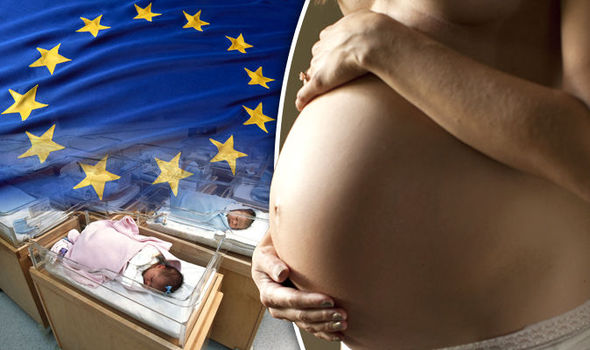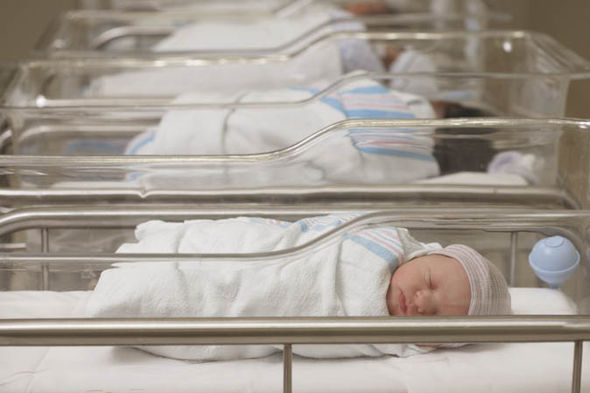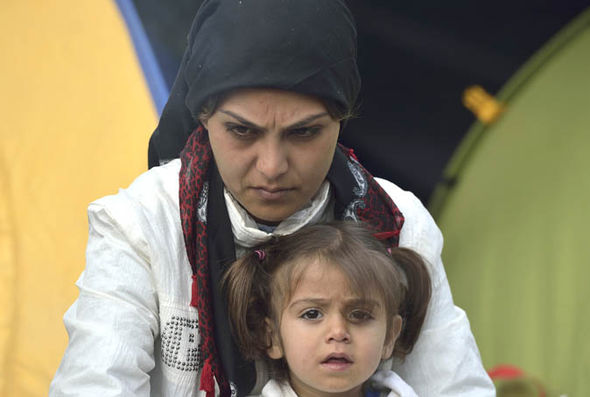Mass migration fuels baby boom: One in SIX of all new European babies now born in UK

ONE in six of all European Union births in a year took place in Britain, official figures reveal.
Experts said the baby explosion was in part fuelled by mass migration to the UK, with more than one in four children born here now having foreign mothers.
The shock figures prompted fears that schools, hospitals, GP surgeries and local authorities will struggle to cope.
Simon Ross, of the Population Matters pressure group, called on the Government to encourage smaller families.
He warned: “A high birth rate, combined with high net migration and people living longer, means more pressure on housing, services and transport.
“The high birth rate is driven partly by migrant mothers, who are increasing.”
There were 776,000 births in Britain in the year 2014 – the second highest total in Europe.
It was an increase of 16 per cent from the 2001 births figure of 669,000, the EU statistics showed.
Britain’s fertility rate also rose to become Europe’s fourth highest.
The number of annual births is now 20 per cent higher than in 1997, when Tony Blair became prime minister and launched New Labour’s open-door immigration policy.
'As the population grows the pressure will grow on services such as housing, schooling and transport' — told Alp Mehmet.
Alp Mehmet, of MigrationWatch, said: “These figures are not surprising, given the fact that the greatest proportion of the growth in births is as a result of migrants.
“It will continue this way when the majority of new households formed in the UK are a result of migration.
“As the population grows beyond our capability to provide for it, the pressure will grow on services such as housing, schooling and transport.”
The startling rise in birth rate comes with the UK population at a record high of 64.8 million – amid predictions that it will soar to 85 million by 2080.
Mr Mehmet warned that with net migration running at more than 336,000 last year, the population explosion could have negative social effects.
He said: “Integration was possible when migration was happening at a slower rate.
"As the pace increases, that becomes increasingly difficult.”
Simon Ross added: “An increase in the number of births of one sixth in just over 10 years is a matter for concern.
“Britain cannot afford to have Europe’s fourth-highest fertility rate, given that it is one of Europe’s most densely populated countries.
“The Government should do more to encourage smaller families.
"This might include improved family planning services and limiting universal support for larger families.”
The new figures were published yesterday by Eurostat, the EU’s statistical wing.
They showed that in 2014 a total of 5.1 million babies were born in the 28 EU member states.
Some 775,900 of those were in the UK, the highest number apart from France, which saw 819,328 births.
The 2001 numbers for the two countries were 669,123 and 804,052 respectively.
Data for fertility rates showed that women in the UK were having more children on average – up from 1.63 per mother in 2001 to 1.81 in 2014.
Romania, Bulgaria, Hungary, Lithuania, Italy and Greece saw birthrates fall but fertility rates rise.
This suggests that women are migrating to richer nations, where their high fertility rates are rapidly increasing numbers of births.
During years of uncontrolled migration under New Labour, more than a million people headed to the UK from new EU members in eastern Europe.
Research has shown that fertility rates of women living in Poland and Lithuania were low until they arrived here, then the birth rate exceeded that of UK-born women.
Mothers who migrated from Africa, Pakistan and Afghanistan had the most children on average.
Office for National Statistics figures recently showed that the number of people in the UK rose by five million in the past 12 years, a faster increase than anywhere else in Europe.
Last year net migration – the difference between those leaving the country and those entering – reached 336,000, despite a pledge from David Cameron to reduce it.
If the rate of growth continues, Britain will have 70 million people – the level some experts say will break public services – by the late 2020s.
Политика конфиденциальности | Правила пользования сайтом









